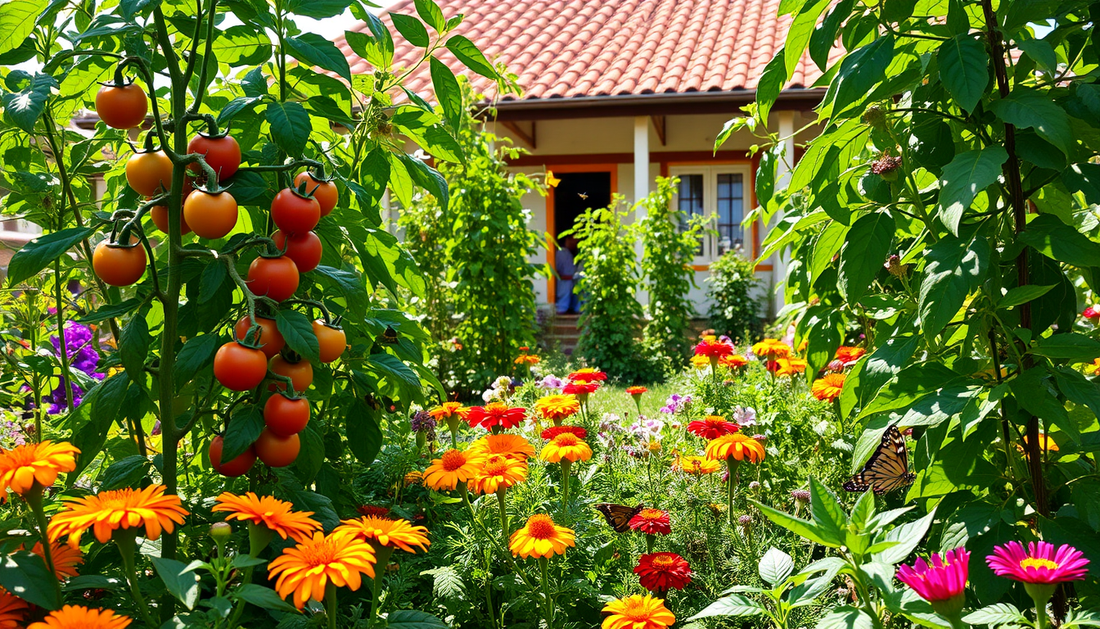
Bloom Together: Companion Planting for Vibrant Bangalore Vegetable Gardens
Share
As the sun rises over the bustling city of Bangalore, gardeners across the region are tending to their beloved vegetable patches, eager to coax the most bountiful harvests from their plots. But amidst the rows of leafy greens and plump tomatoes, a secret to success lies in the careful selection of companion plants – those unsung heroes that can transform a garden into a thriving, harmonious ecosystem.
In the heart of this garden-loving city, Idyl, a one-stop shop for all things gardening, has become a hub of knowledge and inspiration. With their vast selection of plants, fertilizers, and expert gardening services, Idyl has become a trusted name for both seasoned green thumbs and budding horticulturists alike.
The Power of Companion Planting
Companion planting is the art of strategically placing different plants together to create a mutually beneficial relationship. In the context of Bangalore's vibrant vegetable gardens, this approach can unlock a world of possibilities, from enhanced pest control to improved pollination and increased yields.
Pollinators: Nature's Helpers
One of the key benefits of companion planting is the ability to attract a diverse array of pollinators to your garden. By incorporating flowering plants that are irresistible to bees, butterflies, and other beneficial insects, you can ensure that your vegetable crops receive the pollination they need to thrive.
"Marigolds, for instance, are not only visually stunning, but they also emit a scent that repels many common garden pests," explains Aisha, the resident horticulture expert at Idyl. "At the same time, their bright blooms attract a host of pollinators, ensuring that your tomatoes, peppers, and other vegetable plants are well-pollinated."
Pest Control: A Natural Approach
Companion planting can also serve as a natural form of pest control, reducing the need for harsh chemical interventions. Certain plants, such as basil and lavender, emit aromas that can deter common garden pests, while others, like marigolds and nasturtiums, can act as trap crops, drawing attention away from your valuable vegetables.
"By strategically placing these 'pest-repelling' plants around your vegetable beds, you can create a natural barrier that keeps unwanted visitors at bay," says Aisha. "This not only protects your crops but also helps to maintain a healthy, balanced ecosystem in your garden."
Nutrient Cycling: A Symbiotic Relationship
Beyond pest control and pollination, companion planting can also enhance the nutrient cycling in your Bangalore vegetable garden. Some plants, such as legumes, have the ability to fix nitrogen in the soil, making it available for their neighbors. Others, like deep-rooted plants, can help to break up compacted soil and bring essential minerals to the surface.
"By carefully selecting your companion plants, you can create a self-sustaining system where the needs of one plant are met by the contributions of another," explains Aisha. "This not only reduces your reliance on external inputs but also helps to build a thriving, resilient garden ecosystem."
Designing Your Bangalore Vegetable Garden
When it comes to implementing companion planting in your Bangalore vegetable garden, the possibilities are endless. However, it's important to consider the unique growing conditions and microclimates of your specific plot.
Assessing Your Garden's Needs
Before you start planning your companion planting scheme, take the time to assess the unique characteristics of your garden. Consider factors such as soil type, sun exposure, and existing plant communities. This information will help you make informed decisions about which plants will thrive in your particular growing environment.
"At Idyl, we always encourage our customers to start with a thorough evaluation of their garden," says Aisha. "This allows us to provide personalized recommendations that are tailored to their specific needs and challenges."
Layering Your Plantings
One of the key principles of successful companion planting is the concept of layering. By incorporating plants of different heights, growth habits, and maturity rates, you can create a diverse and harmonious garden ecosystem.
"Imagine a vegetable bed where tall, leafy greens like kale or chard are interspersed with low-growing herbs like thyme or oregano," Aisha suggests. "The taller plants provide shade and shelter for the smaller ones, while the herbs' aromatic compounds can help to deter pests."
Seasonal Considerations
Bangalore's tropical climate means that your vegetable garden will likely experience different growing seasons throughout the year. When planning your companion planting scheme, be sure to consider which plants will thrive during each season, ensuring a continuous flow of beneficial interactions.
"In the cooler months, you might want to focus on cool-weather crops like broccoli or cauliflower, paired with winter-hardy flowers like pansies or violas," Aisha advises. "As the temperatures rise, you can transition to heat-loving vegetables like okra or eggplant, complemented by drought-tolerant companions like marigolds or zinnias."
Idyl: Your Gardening Companion
At Idyl, the team of passionate horticulturists is dedicated to helping Bangalore's gardeners unlock the full potential of their vegetable plots through the power of companion planting. With their extensive plant selection, expert advice, and personalized gardening services, Idyl is the ultimate destination for anyone looking to create a thriving, harmonious garden ecosystem.
"We understand that every garden is unique, and that's why we take the time to listen to our customers' needs and provide tailored solutions," says Aisha. "Whether you're a seasoned gardener or just starting out, our team is here to guide you through the process of designing and maintaining a vibrant, productive vegetable garden."
So, as you embark on your gardening journey in Bangalore, remember the magic of companion planting. By embracing the symbiotic relationships between your vegetables and their flowering companions, you can unlock a world of abundance, resilience, and natural beauty in your very own backyard.
